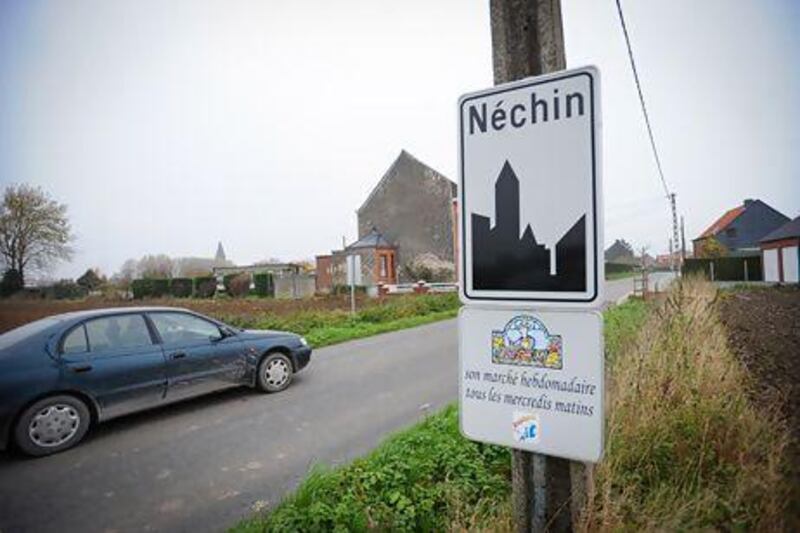A small Belgian village has become an unexpected symbol of French resistance for wealthy refugees from the high-tax policies of François Hollande's socialist government.
Néchin, just 3 kilometres from the French border and a little more than an hour by road from the Belgian capital Brussels, is no Monaco or Geneva.
The surrounding countryside is pleasant but hardly breathtaking. There is a medieval fortified castle, a centrepiece church built after the original was destroyed in the First World War and a cafe whose name translates as "friendship".
But this unprepossessing fringe of Belgium's French-speaking Wallonia region has become a magnet for French people determined to keep Mr Hollande's hands off their fortunes.
Prosperous French families have bought homes there, enabling them to take advantage of a fiscal regime that was already less punitive of the rich; more are reportedly intent on following as the socialists prepare to introduce a 75 per cent tax on all earnings above €1 million (Dh4.7m) a year.
The flight of wealth coincides with fierce debate in which Mr Hollande and ministers passionately defend their policies as critics portray France and its economic management - or, as they would have it, mismanagement - as central to the euro crisis.
Prominent socialists have reacted angrily to a cover story in The Economist likening the French economy to a time bomb.
The prime minister, Jean-Marc Ayrault, said that France was "not at all impressed" and the Hollande-supporting daily newspaper Libération ran a sequence of past covers of The Economist critical of French politics.
One showed the former British conservative prime minister Margaret Thatcher in 2006 with the slogan "What France needs". This year, "the rather dangerous Mr Hollande" was depicted on the eve of his election as a slightly shifty figure emerging from behind the French tricolour.
The response of those who wish the new president well is understandable.
Even before the new controversy, Jacques Reland, the pro-Hollande head of European research at the Global Policy Institute in Paris, had told The National overseas criticism of French economic performance was "wildly exaggerated".
Now, describing the report as "ridiculous", he adds: "It confirms what I think. The forces of social regression are at work in UK as well as Germany. [Mr] Hollande is right not to want to throw out the baby with the bath water."
Mr Hollande is in combative mood. "I know some bosses want to leave the country, because they've made their fortunes or wish to pass on their assets to their children, avoiding certain obligations," he told the left-of-centre news magazine Le Nouvel Observateur. "But the real entrepreneurs, those who are part of the action, remain in France. These are the patriots. I know we are asking them to make an effort and they accept it."
Among those who share his assessment of France's problems, and the correct remedies, there is scorn for what Le Nouvel Observateur called the "anti-Hollande crusade" mounted by opponents even in France.
"For the health of democracy, we need intelligent opposition to socialism," wrote , Laurent Joffrin, the paper's editorial director. "Instead, we hear only that which is derogatory, inconsistent and ridiculous."
But beyond party squabbling, it is clear some of France's better-off have no desire to see the socialist experiment through.
According to Mr Hollande's critics, wealth creators whose financial clout and enterprise make them a potential source of new employment, will increasingly feel they are being driven out by a harsh fiscal climate.
The president promises to keep the 75 per cent upper rate for no more than two years.
But back on the Franco-Belgian border, one in four of Néchin's population of about 2,000 is already French. High-profile residents include members of the Mulliez family, the owners of the Auchan supermarket chain.
The actor Gérard Depardieu, who has starred in scores of films in a career spanning more than 40 years, is reported by the Belgian press to be on the point of completing the purchase of a mansion in Néchin for €520,000. Depardieu, who grew up in a poor family and was a delinquent truant in his early teens, supported Mr Hollande's centre-right predecessor, Nicolas Sarkozy. He has not commented on the Belgian link but news of his gesture, if correct, speaks volumes.
Europe's richest man, Bernard Arnaud, the French head of the luxury goods empire LVMH, has applied for Belgian nationality. He insists he will continue to meet his tax commitments in France but it is fair to say that pledge has, to an extent, fallen on deaf ears.
Perhaps to his own dismay, the attitude of Mr Hollande may have been summed up for France's moneyed minority by an incautious remark, caught on television before the presidential elections, that he disliked the rich.
The response of the affluent - and conservatives more generally - is encapsulated in a statement by François Fillon, the former prime minister, deriding the proposed tax regime that spurred Mr Arnaud's wish to acquire Belgian nationality.
"When you take stupid decisions, you get these terrible results," he said.
"The chief of one of the best companies in the world, who symbolises French know-how and success, known throughout the world, has been prompted to change his nationality because of the fiscal policy which is being applied in our country."






